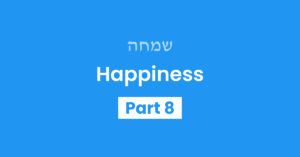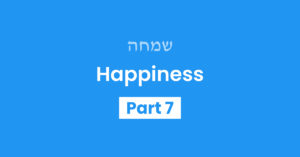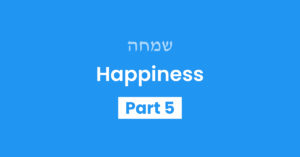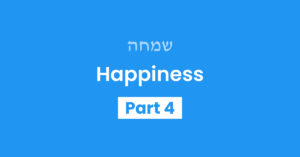Why did Haman want to wipe out the Jewish people?
According to the basic story in the Megillah, Haman wanted everyone to bow down to him. But Mordechai refused to bow down. This made Haman so angry that he decided to wipe out Mordechai’s entire nation – the Jewish people.
But in truth, Haman’s anger had a deeper source. Chazal teach us that every bad decree against the Jews is really rooted in a spiritual cause. For example, when Amalek attacked the Jewish people, the spiritual cause was that the Jews had weakened their connection to Torah.1 When the Jews became less connected to Torah, Hashem allowed Amalek to attack.
So what was the spiritual cause of Haman’s decree?
The Gemara2 explains: “Why were the Jewish people deserving of death in the times of Purim? Because they enjoyed eating at the festive meal of Achashveirosh.” In the opening of Megilas Esther, we read about the extravagant party thrown by Achashveirosh, in which he tried to entice the Jewish people to engage in every delicious food and physical pleasure imaginable. Although Mordechai warned the Jews not to partake in this party, many Jews gave in to these temptations and did eat at the party.3
“Why were the Jewish people deserving of death in the times of Purim? Because they enjoyed eating at the festive meal of Achashveirosh.“
In order to rectify the sin of eating at Achashveirosh’s party, the Jews had to fast, daven, and do teshuva. Hashem saw their sincere teshuva, and prevented Haman from carrying out his evil plot.
So we see here that the root of the Purim story began when the Jewish people sinned with food, and failed to exercise self-control.
Interestingly, there is another connection between Purim and sinning with food: The Gemara4 asks: “Where can we find a hint to Haman in the Torah? It is by the sin of eating from the Tree of Knowledge, when Hashem asked Adam, ‘HaMinHaEitz… Did you eat from the tree that I had commanded you to avoid?’5” The very first sin of mankind happened when Adam ate food that he shouldn’t have eaten.
Why did the Gemara find a source for Haman specifically within the Torah’s description of Adam eating from the Tree of Knowledge? The Sfas Emes6 explains that Haman was only able to come to power when the Jews sinned with food and succumbed to their physical desires at Achashveirosh’s party. When the Jews slipped up in this way, Hashem allowed Haman to make a decree against the Jewish people, so as to scare the Jewish people into doing teshuva.
Haman was only able to come to power when the Jews sinned with food and succumbed to their physical desires
Relevance to Today
Now that we understand that the root of the Purim story came from sinning with food, this week of Purim is a good time to focus on eating in the proper manner.
Most people can probably relate to the desire to eat more than one’s fill. It’s hard to resist that extra cookie, scoop of ice cream, or piece of cake. But Chazal tell us that being careful with what we eat – and especially avoiding overeating – is an essential component of spiritual growth.
Resisting temptations is actually relevant to many more areas of life – not just eating. We can practice exercising self-control in ALL areas of life – whether refraining from speaking a tempting piece of lashon hara, holding ourselves back from saying a joke that may be insensitive, or turning away from seeing things that are not so appropriate.
Eating and Happiness
Exercising self-control in the realm of eating is not only good for our health, but it also gives us a feeling of happiness. How so?
Rav Dessler7 explains: When a person feels tempted to eat something they shouldn’t, it is coming from a deeply-rooted feeling of lack. It may be a feeling of emotional lack (e.g. “No one cares about me”) or a spiritual lack (e.g. “I am failing to grow in the way I want to grow”). Instead of filling this lack with real spiritual growth, a person tries to fill the lack by filling up on other things – physical things… which might be damaging to their health.
But it’s all just an illusion. No amount of physical food (or clothing, or possessions) can ever fill a spiritual lack. So the person ends up succumbing to their desires – eating food they shouldn’t be eating – and they are still left with a gaping spiritual hole. The physical food did nothing to help fill their lack, and they are no happier than they were before.
By contrast, when you hold yourself back from giving in to your desires – for example, resisting that extra piece of cake – you can acquire a real, deep sense of happiness. This is because you haven given up the minor, temporary, fleeting pleasure of food – to instead acquire something eternal and much greater: self-control.
This is because you haven given up the minor, temporary, fleeting pleasure of food – to instead acquire something eternal and much greater: self-control.
Self-control is the key to all middos. The more we exercise self-control, the better we will be able to stick to Hashem’s mitzvos, interact properly with the people around us, and feel an inner sense of peace and calm.
As we explained last month – Happiness comes from focusing on what you have acquired.
When you are looking at that tempting piece of cake, it is time to make a decision: What do you prefer to acquire? The fleeting, momentary pleasure of eating a piece of cake? Or the eternal reward you will earn by exercising self-control?
It is definitely tempting to give in to our desires, but if we can practice exercising just a little bit of self-control, then we will be on a good path of real spiritual growth.
Sources: [1] Yalkut Shemoni on Shemos 17; [2] Megilla 12a; [3] Maharal in Ohr Chadash pg. 144; [4] Chullin 139b [5] Bereishis 3:11; [6] Sfas Emes on Purim 654; [7] Strive for Truth, Vol I. pg 100
Your Challenge
Once a day, do something VERY SMALL to exercise self-control.
FOR EXAMPLE:
- Leave over a bit of food on your plate instead of eating every last drop.
- Hold yourself back from saying a piece of lashon hara (or even something you think MIGHT be lashon hara…).
- Hold yourself back from saying a joke or comment that another person might feel a little hurt by.
- Turn away from looking at something that you shouldn’t be seeing.
- Hold back from doing something when you’re not sure if it’s allowed
Torah Questions
- There were 4 people in Tanach who were so happy to set out on their journeys, that they harnessed their chariots with joy and enthusiasm. Name 2 of the 4 people. (Hint: Look in Parshas Vayeira, Vayigash, Beshalach, and Balak)
- There was a person in Sefer Melachim II who was unable to receive nevuah (prophecy) because he was angry. He therefore asked for a musician to play music to make him happy again. Who was this person? (See Melachim II 3:15)
- Fill in the blank: The Gemara (Sukkos 51a) says that whoever has not witnessed ________ has never seen true joy.
- Divrei Hayamim I 16:31 says there will be a time in the future when the Heaven and Earth will rejoice. What will cause them to rejoice?
- There are many different Hebrew words that refer to different types of happiness. How many can you name? (List at least 3, other than “simcha”)
- We say in Maariv davening that Moshe and Bnai Yisrael raised their voices in song, and said something “with tremendous joy” (b’Simcha Rabbah): Which words did they say with tremendous joy?
Questions to Ponder
- Did you ever feel happy when you exercised self-control?
- What makes it hard to exercise self-control?
- What can you do to help yourself have more self-control?
- The Sfas Emes writes that the mitzvah of Bris Milah is connected to happiness. Why?
- It says in Tehillim (2:11): “Serve Hashem with fear, and be joyous in trembling.” How is it possible to be joyous while trembling? Is it possible to feel fear and happiness at the same time?





